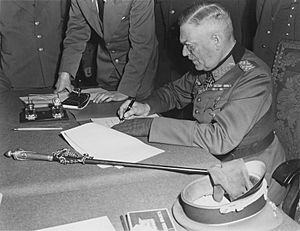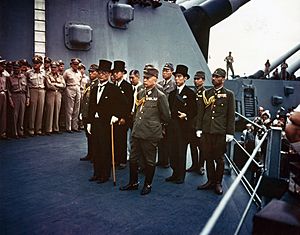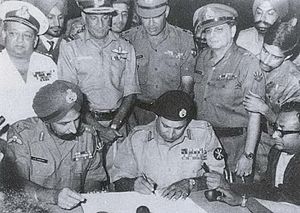Unconditional surrender facts for kids
An unconditional surrender is when one side in a conflict agrees to surrender without any promises or deals made for their protection. The side demanding the surrender often threatens to completely destroy their enemy if they don't agree.
Announcing that only an unconditional surrender is acceptable can put a lot of mental pressure on the weaker side. However, it can also make the fighting last longer because the enemy might feel they have nothing to lose by continuing to fight. Usually, a side only demands unconditional surrender when they are much stronger and feel certain they will win the war.
Today, unconditional surrenders usually include protections given by international law. This means that even without special conditions, the surrendering soldiers are supposed to be treated humanely. Sometimes, the term "unconditional surrender" is used for symbolic reasons, even if some basic terms have been informally agreed upon.
Contents
Examples of Unconditional Surrender
Banu Qurayza Tribe
After the Battle of the Trench, the early Muslim army surrounded the neighborhood of the Banu Qurayza tribe. This led to the tribe's unconditional surrender. This event helped Islam become more influential in the region.
Napoleon Bonaparte
When Napoleon Bonaparte escaped from his exile on the island of Elba in 1815, European leaders at the Congress of Vienna declared him an outlaw. This meant he was no longer protected by the law.
They announced that by breaking the treaty that sent him to Elba, Napoleon had lost his legal rights. They said he was an "enemy and disturber of the tranquillity of the world."
Because he was considered an outlaw, when Napoleon surrendered to the British, they were not legally required to spare his life. However, they chose not to execute him. Instead, they exiled him to the very remote island of Saint Helena in the South Atlantic Ocean.
American Civil War
One of the most famous uses of the phrase happened during the American Civil War. In 1862, at the Battle of Fort Donelson, Confederate General Simon Bolivar Buckner asked for surrender terms from Union General Ulysses S. Grant.
Grant's famous reply was, "no terms except an unconditional and immediate surrender can be accepted. I propose to move immediately upon your works."
When news of Grant's victory reached Washington, D.C., newspapers pointed out that his initials, "U.S.," could stand for "Unconditional Surrender." The nickname stuck with him for the rest of his life.
However, not all of Grant's victories ended this way. When Confederate General Robert E. Lee surrendered at Appomattox Court House in 1865, Grant offered generous terms. He allowed Lee's men to go home and keep their horses and sidearms. Similar fair terms were offered at other surrenders.
World War II


The term "unconditional surrender" was used again during World War II. At the Casablanca Conference in 1943, U.S. President Franklin D. Roosevelt announced it was the goal of the Allies against Germany, Italy, and Japan.
The demand was also included in the Potsdam Declaration, a message sent to Japan on July 26, 1945. It called for the "unconditional surrender of all Japanese armed forces" and warned that the only other option was "prompt and utter destruction."
Some historians argue that demanding unconditional surrender made the war in Europe longer. German propaganda used it to convince citizens to keep fighting. It may have also discouraged Germans who wanted to overthrow Adolf Hitler, because they couldn't get any promises from the Allies about how Germany would be treated after the war.
One reason the Allies insisted on it was to avoid what happened after World War I. After that war, a false idea called the stab-in-the-back myth spread in Germany. It claimed Germany didn't really lose the war but was betrayed by its own people. An unconditional surrender would make it clear to everyone that Germany had been defeated on the battlefield.
Bangladesh War of Independence
On December 16, 1971, the commanding officer of the Pakistan Armed Forces in East Pakistan (now Bangladesh) signed an Instrument of Surrender. He handed over control of his 93,000 soldiers to the Indian Army.
This unconditional surrender ended the fighting and led to the creation of the independent country of Bangladesh. The surrendered soldiers were guaranteed safety under the Geneva Conventions.
War in Afghanistan
On August 15, 2021, the government of the Islamic Republic of Afghanistan and its army unconditionally surrendered to the Taliban. This event brought an end to the long war. The Taliban then took control of the country and formed a new government.
Surrender at Discretion
In the past, especially during a siege, the demand for an unconditional surrender was often phrased as "surrender at discretion." If the two sides negotiated and agreed on conditions, it was called "surrendering on terms."
A famous example of this was at the Battle of the Alamo. The Mexican general Antonio López de Santa Anna demanded that the Texan defenders surrender at discretion. The Texan commander, William B. Travis, refused. He answered the demand by firing a cannon shot.
The phrase "surrender at discretion" is still used in modern international law. For example, the Rome Statute, a treaty that created the International Criminal Court, lists killing a soldier who "has surrendered at discretion" as a war crime. This rule is part of the official laws of war and is based on the Hague Convention of 1907.
See also
 In Spanish: Rendición incondicional para niños
In Spanish: Rendición incondicional para niños
- Surrender (military)
- Debellatio
- Military occupation
- No quarter
 | Bayard Rustin |
 | Jeannette Carter |
 | Jeremiah A. Brown |


